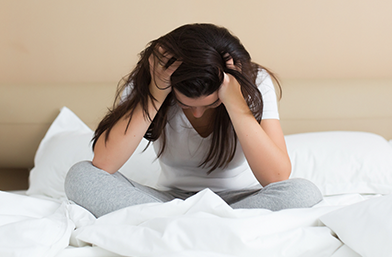Teen Insomnia and CBT
If your teen suffers from an anxiety-related disorder, he or she may have trouble sleeping at night or have a disordered sleep schedule.
While insomnia is problematic for any age group, it can be especially tough for teens since they experience a natural shift in their circadian rhythms and, according to Johns Hopkins medical experts need more sleep than other age groups.
Sleep deprivation can negatively impact mood, behavior, family and friend relationships, and academic success. If your teen is busy with homework, extracurricular activities, or a part-time job, they may become anxious about having enough energy to complete these tasks. One way to manage anxiety-related insomnia is with counseling with Cognitive Behavioral Therapy (CBT), which has been shown to be effective in treating adolescent sleep problems.

What Is Cognitive Behavioral Therapy?
CBT is a psychotherapeutic approach that focuses on learning how to identify and change unhelpful or even destructive thought patterns that negatively influence behavior and emotions.
During CBT, the teen is shown how to regulate negative or distressing emotions and how to challenge unhelpful thoughts or cognitive distortions. CBT can provide teens with tools and coping strategies that he or she can use outside the counselor’s office to modulate and manage emotions rather than becoming overwhelmed by stress and anxiety.
How can CBT be used to cope with insomnia?
There are many types of coping strategies your child can use with CBT.
CBT can help with overcoming insomnia through a variety of techniques such as stimulus control/ breathing/ relaxation/ mindfulness/ journaling and creative expression exercises. While each client’s needs are different, here are a few techniques that may be integrated into treating difficulties with sleep:
Stimulus Control
Some teens with anxiety-related insomnia may need to strengthen the cues in their bedroom for sleep and relaxation. For instance, if your child has a TV, computer, videogame console, or cellphone in his bedroom, it may be hard to get into a relaxing mindset for sleep. Monitoring and modulating behavioral and/or environmental stimuli can help.
The blue light emitted by screens on electronic devices suppresses melatonin, a hormone that helps to regulate sleep-wake cycles. Social media devices can also trigger anxiety and insomnia, since they can lead to fear of missing out, which can cause teens to lose sleep because they are worried about missing important updates from their friends.
Using CBT a counselor can help your teen track their screen time as well as their feelings when they view certain media. The therapist may ask your teen to remove screens and other distracting belongings from their bedroom so that the area is associated with sleep and relaxation.
Breathing Exercises
Breathing exercises which slow the heart rate, can be an excellent way to reduce feelings of anxiety, anger, depression, or other negative emotions that may be keeping your teen up at night.
A CBT therapist may recommend that your child incorporate meditation or yoga poses into their bedtime routine. Mindful, diaphragmatic breathing is an important part of any yoga practice and could help your child feel calmer before going to sleep. In fact, studies have shown that yoga can help with insomnia or insomnia-related to disorders, like anxiety.
Journaling Exercises
Sometimes people with anxiety can’t sleep due to rumination and worry. Journaling is a great tool, both in counseling and at home, and can help teens to identify common fears and triggers that are causing them anxiety and insomnia. By writing down worries, they can become more capable of challenging cognitive distortions and processing difficult emotions.
Therapeutic journaling can be used to help identify behavioral patterns and coping strategies that have or haven’t worked in the past. Getting worries out on paper can help clear the mind of stress which results in more restful sleep.
For more information about helping your teen with anxiety, please contact us at the Anxiety Institute.
Also from Sarah Pauker ...
 Meditation for Sleep
Meditation for Sleep
Also from the author, Sarah Pauker, a meditation intended to be done in bed to promote restful sleep by relaxing the body, quieting the mind, and creating a sense of calm and wellbeing.
“My personal knowledge and experience of anxiety and fear, as a victim and as a conqueror, has gifted me the valuable asset of emotional intelligence. Knowledge and experience that will give me the empathy to connect with others and the grit to overcome adversity.”



